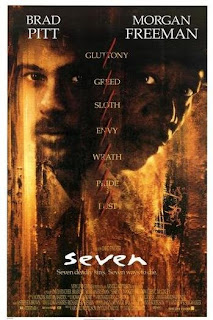
In a movie that I compare to
Bubba Hotep in how absurd it was,
The Big Lebowski was an extremely interesting movie, both in entertainment and film style. I really enjoyed it and thought it did a good job in portraying a story through the technique and characters. Also, for a movie that we were to look for similarities between it and
The Big Sleep as well as Film Noir, I really had a hard time concentrating on looking for that, being distracted by the movie in general.
There were a lot of neat things about
The Big Lebowski. In addition to hearing the many different ways to say the f word, I had a good time experiencing the movie on a whole. I liked the cast a lot and the setting always seemed to fit the movie and what was going on perfectly. What I really liked about this movie was that it didn't have to be too complex of a movie, meaning that we didn't need all these special effects and major actors or actresses to have a quality, modern movie. Other things that were also very solid in
The Big Lebowski was its ability to keep the viewer interested, not only in their language and how funny they were acting but the actual story and how the story played out through the characters and therefore from the camera.
While in the Film Noir movie, we watched this movie to compare it to
The Big Sleep, which has been said to have quite a few similarities. One of the major similarities was the "mock role" of the general in
The Big Sleep
to the big Lebowski in the movie. Along with that, the other two characters that mocked each other's role was the Dude and Bogey, especially whenever they are around their bosses, which was the general for Bogey and the big Lebowski for the Dude. I also saw another similarity in the storyline. What I mean by this is not necessairily that the stories matched each other, but more that they both started off with this one goal in mind and eventually it branched out into a bunch of different stories, some fitting and some random.
The Big Lebowski, in this case was easier to follow and understand. And of course, both movies left you hanging, wondering what happend here and there and basically everywhere. Anyways, for me, I really only saw a few similarities between the two movies, although I did see a few more similarities between a typical Film Noir movie and
The Big Lebowski. This is why you can basically name this movie a modern Film Noir movie, if there is such a thing.
As I mentioned earlier, I did not like the ending. I still have so many unanswered questions - What happend to Jesus? Did they win the bowling tournament? What did they get out of the whole deal? Did they gain any money? Did he get his rug back? Is his room tied together now? Did the Big Lebowski get what was coming for him? Did the guy looking for his money sing like he did in
Buffalo '66? So many questions, so little answers...
Regardless,
The Big Lebowski was quite a movie to stick into the curriculum. I enjoyed it and thought it was very fitting to what we were discussing because even though I didn't catch numerous similarities in the two movies mentioned above, there were quite a few. This is neat because it is interesting how film is so continious and just keeps growing, but growing out of what started it, including movies like
The Big Sleep.
-Kevin








